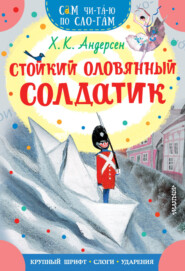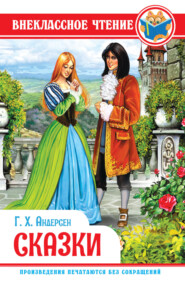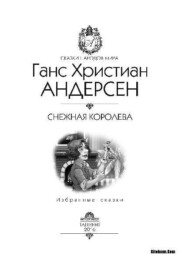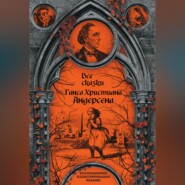По всем вопросам обращайтесь на: info@litportal.ru
(©) 2003-2024.
✖
O. T., A Danish Romance
Настройки чтения
Размер шрифта
Высота строк
Поля
The following forenoon he paid a visit to Professor Weyse.
“You are going to Roeskelde, are you not?” asked Wilhelm. “I have heard you so often play the organ here in Our Lady’s church, I should very much like to hear you there, in the cathedral. If I were to make the journey, would you then play a voluntary for me?”
“You will not come!” said the musician.
“I shall come!” answered Wilhelm, and kept his word. Two days after this conversation he rolled through the streets of Roeskelde.
“I am come for a wager! I shall hear Weyse play the organ!” said he to the host, although there was no need for an apology.
Bulwer in his romance, “The Pilgrims of the Rhine,” has with endless grace and tenderness called forth a fairy world. The little spirits float there as the breath of air floats around the material reality; one is forced to believe in their existence. With a genius powerful as that which inspired Bulwer, glorious as that which infused into Shakespeare the fragrance we find breathed over the “Midsummer-night’s Dream,” did Weyse’s tones fill Wilhelm; the deep melodies of the organ in the old cathedral had indeed attracted him to the quiet little town! The powerful tones of the heart summoned him! Through them even every day things assumed a coloring, an expression of beauty, such as Byron shows us in words, Thorwaldsen in the hard stone, Correggio in colors.
We have by Goethe a glorious poem, “Love a Landscape-painter.” The poet sits upon a peak and gazes before him into the mist, which, like canvas spread upon the easel, conceals all heights and expanses; then comes the God of Love and teaches him how to paint a picture on the mist. The little one now sketches with his rosy fingers a picture such as only Nature and Goethe give us. Were the poet here, we could offer him no rock on which he might seat himself, but something, through legends and songs, equally beautiful. He would then sing,—I seated myself upon the mossy stone above the cairn; the mist resembled outstretched canvas. The God of Love commenced on this his sketch. High up he painted a glorious still, whose rays were dazzling! The edges of the clouds he made as of gold, and let the rays penetrate through them; then painted he the fine light boughs of fresh, fragrant trees; brought forth one hill after the other. Behind these, half-concealed, lay a little town, above which rose a mighty church; two tall towers with high spires rose into the air; and below the church, far out, where woods formed the horizon, drew he a bay so naturally! it seemed to play with the sunbeams as if the waves splashed up against the coast. Now appeared flowers; to the fields and meadows he gave the coloring of velvet and precious stones; and on the other side of the bay the dark woods melted away into a bluish mist. “I can paint!” said the little one; “but the most difficult still remains to do.” And he drew with his delicate finger, just where the rays of the sun fell most glowingly, a maiden so gentle, so sweet, with dark blue eyes and cheeks as blooming as the rosy fingers which formed the picture. And see! a breeze arose; the leaves of the trees quivered; the expanse of water ruffled itself; the dress of the maiden was gently stirred; the maiden herself approached: the picture itself was a reality! And thus did the old royal city present itself before Wilhelm’s eyes, the towers of the cathedral, she tay, the far woods, and—Eva!
The first love of a pure heart is holy! This holiness may be indicated, but not described! We return to Otto.
CHAPTER XXII
“A man only gains importance by a poet’s fancy, when his genius vividly represents to our imagination a clearer, but not an ennobled image of men and objects which have an existence; then alone he understands how to idealize.”—H.
HERTZ.
We pass on several weeks. It was toward the end of September, the examen philosophicum was near. Preparations for this had been Otto’s excuse for not yet having visited the family circle of his guardian, the merchant Berger. This was, however, brought about by Otto’s finding one day, when he went to speak with his guardian, the mistress of the house in the same room. We know that there are five daughters in the house, and that only one is engaged, yet they are all well-educated girls—domestic girls, as their mother assured her friend upon more than one occasion.
“So, then, I have at length the honor of making your acquaintance,” said Mrs. Berger, “this visit, truly, is not intended either for me or the children, but still you must now drink a cup of coffee with us. Within it certainly looks rather disorderly; the girls are making cloaks for the winter. We will not put ourselves out of the way for you: you shall be regarded as a member of the family: but then you must come to us in a friendly way. Every Thursday our son-in-law dines with us, will you then be contented with our dinner? Now you shall become acquainted with my daughters.”
“And I must to my office,” said the husband; “therefore let us consider Thursday as an appointment. We dine at three o’clock, and after coffee Laide gives us music.”
The lady now conducted Otto into the sitting-room, where he found the four daughters in full activity with a workwoman. The fifth daughter, Julle, was, as they had told him, gone to the shops for patterns: yesterday she had run all over the town, but the patterns she received were not good.
The lady told him the name of each daughter; their characteristics he naturally learnt later.
All the five sisters had the idea that they were so extremely different, and yet they resembled each other to a hair. Adelaide, or Laide, as she was also called, was certainly the prettiest; that she well knew also, therefore she would have a fur cape, and no cloak; her figure should be seen. Christiane was what one might call a practical girl; she knew how to make use of everything. Alvilde had always a little attack of the tooth-ache; Julle went shopping, and Miss Grethe was the bride. She was also musical, and was considered witty. Thus she said one evening when the house-door was closed, and groaned dreadfully on its hinges, “See now, we have port wine after dinner.”[15 - Translator’s Note: A pun which it is impossible to translate. The Danish word Portviin according to sound, may mean either port wine or the creaking of a door.] The brother, the only son of the house, with whom we shall become better acquainted, had written down this conceit; “but that was only to be rude toward her,” said Miss Grethe. “Such good ideas as this I have every hour of the day!”
We ought really to accuse these excellent girls of nothing foolish; they were very good and wise. The lover, Mr. Svane, was also a zealous wit; he was so lively, they said. Every one with whom he became a little familiar he called immediately Mr. Petersen, and that was so droll!
“Now the father has invited Mr. Thostrup to come on Thursday!” said the lady. “I also think, if we were to squeeze ourselves a little together, he might find a place with us in the box; the room is, truly, very confined.”
Otto besought them not to incommode themselves.
“O, it is a large box!” said the lady, but she did not say how many of them were already in it. Only eleven ladies went from the family itself. They were obliged to go to the theatre in three parties, so that people might not think; if they all went together, there was a mob. One evening, when the box had been occupied by eighteen persons, beside several twelve-year old children, who had sat in people’s laps, or stood before them, and the whole party had returned home in one procession, and were standing before the house door to go in, people streamed together, imagining there was some alarm, or that some one had fallen into convulsions. “What is the matter?” they asked, and Miss Grethe immediately replied, “It is a select company!”[16 - Translator’s Note: A select or shut-out company. We regret that this pun, like the foregoing one, is untransferable into English.] Since that evening they returned home in separate divisions.
“It is really a good box!” said Alvilde; “if we had only other neighbors! The doors are opening and shutting eternally, and make a draught which is not bearable for the teeth. And then they speak so loud! the other night I did not hear a single word of the pretty song about Denmark.”
“But did you lose much through that?” asked Otto, smiling, and soon they found themselves very much at variance, just as if they had been old acquaintances. “I do not think much of these patriotic scraps, where the poet, in his weakness, supports himself by this beautiful sentiment of patriotism in the people. You will certainly grant that here the multitude always applauds when it only hears the word ‘Father-land,’ or the name of ‘Christian IV.’ The poet must give something more; this is a left-handed kind of patriotism. One would really believe that Denmark were the only country in the world!”
“Fie, Mr. Thostrup!” said the lady: “do you not then love your father-land?”
“I believe I love it properly!” returned he: “and because it really possesses so much that is excellent do I desire that only what is genuine should be esteemed, only what is genuine be prized.”
“I agree in the main with Mr. Thostrup,” said Miss Grethe, who was busied in unpicking and turning her cloak, in order, as she herself said, to spoil it on the other side. “I think he is right! If a poem is well spoken on the stage, it has always a kind of effect. It is just the same as with stuffs—they may be of a middling quality and may have an unfavorable pattern, but if they are worn by a pretty figure they look well after all!”
“I am often vexed with the public!” said Otto. “It applauds at improper places, and sometimes exhibits an extraordinary innocence.”
“Those are ‘the lords of the kingdom of mind,’” said Miss Grethe, smiling.[17 - Note:“We are the lords of the kingdom of mind!We are the stem which can never decay!”—Students’ Song, by CHRISTIAN WINTHER.]
“No, the neighbors!” replied Otto quickly.
At this moment Miss Julle entered. She had been wandering from shop to shop, she said, until she could bear it no longer! She had had the stuffs down from all the shelves, and at length had succeeded so far as to become possessed of eight small pieces—beautiful patterns, she maintained. And now she knew very well where the different stuffs were to be had, how wide they were, and how much the yard. “And whom did I meet?” said she; “only think! down the middle of East Street came the actor—you know well! Our little passion! He is really charming off the stage.”
“Did you meet him?” said Laide. “That girl is always lucky!”
“Mr. Thostrup,” said the mother, presenting him, for the young lady seemed to forget him entirely, so much was she occupied with this encounter and her patterns.
Julle bowed, and said she had seen him before: he had heard Mynster, and had stood near the chair where she sat; he was dressed in an olive-green coat.
“Then you are acquainted with each other!” said the lady. “She is the most pious of all the children. When the others rave about Spindler and Johanne Schoppenhauer, she raves about the clergyman who confirmed her. You know my son? He became a student a year before you. He sees you in the club sometimes.”
“There you will have seen him more amiable than you will find him at home,” said Adelaide. “Heaven knows he is not gallant toward his sisters!”
“Sweet Laide, how can you say so!” cried the mother. “You are always so unjust toward Hans Peter! When you become better acquainted with him, Mr. Thostrup, you will like him; he is a really serious young man, of uncorrupted manners. Do you remember, Laide, how he hissed that evening in the theatre when they gave that immoral piece? And how angry he is with that ‘Red Riding Hood?’ O, the good youth! Besides, in our family, you will soon meet with an old acquaintance—in a fortnight a lady out of Jutland will come here. She remains the winter here. Do you not guess who it is? A little lady from Lemvig!”
“Maren!” exclaimed Otto.
“Yes, truly!” said the lady. “She is said to have such a beautiful voice!”
“Yes, in Lemvig,” remarked Adelaide. “And what a horrible name she has! We must christen her again, when she comes. She must be called Mara, or Massa.”
“We could call her Massa Carara!” said Grethe.
“No; she shall be called Maja, as in the ‘Every-day Tales,’” said Christiane.
“I am of Jane’s opinion!” said the mother. “We will christen her again, and call her Maja.”
CHAPTER XXIII
Men are not always what they seem.—LESSING.
Our tale is no creation of fancy; it is the reality in which we live; bone of our bone, and flesh of our flesh. Our own time and the men of our own age we shall see. But not alone will we occupy ourselves with every-day life, with the moss on the surface; the whole tree, from the roots to the fragrant leaves, will we observe. The heavy earth shall press the roots, the moss and bark of every-day life adhere to the stern, the strong boughs with flowers and leaves spread themselves out, whilst the sun of poetry shall shine among them, and show the colors, odor, and singing-birds. But the tree of reality cannot shoot up so soon as that of fancy, like the enchantment in Tieck’s “Elves.” We must seek our type in nature. Often may there be an appearance of cessation; but that is not the case. It is even so with our story; whilst our characters, by mutual discourse, make themselves worthy of contemplation, there arises, as with the individual branches of the tree, an unseen connection. The branch which shoots high up in the air, as though it would separate itself from the mother-stem, only presses forward to form the crown, to lend uniformity to the whole tree. The lines which diverge from the general centre are precisely those which produce the harmony.
We shall, therefore, soon see, though these scenes out of every-day life are no digression from the principal events, nothing episodical which one may pass over. In order still sooner to arrive at a clear perception of this assertion, we will yet tarry a few moments in the house of Mr. Berger, the merchant; but in the mean time we have advanced three weeks. Wilhelm and Otto had happily passed their examen philosophicum. The latter had paid several visits, and was already regarded as an old friend of the family. The lover already addressed him with his droll “Good day, Mr. Petersen;” and Grethe was witty about his melancholy glance, which he was not always able to conquer. She called it “making faces,” and besought him to appear so on the day of her funeral.
The object of the five sisters’ first Platonic love had been their brother. They had overwhelmed him with caresses and tenderness, had admired and worshipped him. “The dear little man!” they called him; they had no other. But Hans Peter was so impolite and teasing toward the dear sisters, that they were found to resign him so soon as one of them had a lover. Upon this lover they all clung. Each one seemed to have a piece of him. He was Grethe’s bridegroom, would be their brother-in-law. They might address him with the confidential thou, and even give him a little kiss.
Otto’s appearance in the family caused these rays to change their direction. Otto was handsome, and possessed of fortune; either of which often suffices to bow a female heart. Beauty bribes the thoughtless; riches, the prudent.
Maren, or as she was here called, Maja, had arrived. The young ladies had already pulled off some of her bows, arranged her hair differently, and made one of her silk handkerchiefs into an apron; but, spite of all this finesse, she still remained the lady from Lemvig. They could remove no bows from her pronunciation. She had been the first at home; here she could not take that rank. This evening she was to see in the theatre, for the first time, the ballet of the “Somnambule.”
“It is French!” said Hans Peter; “and frivolous, like everything that we have from them.”

















